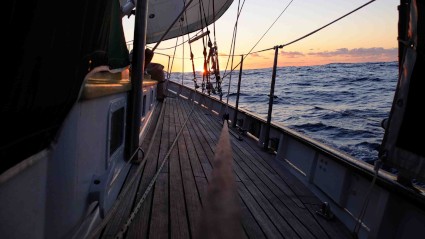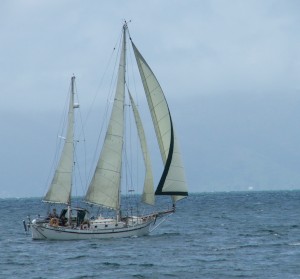
The Next Adventure
03 February 2022
23 January 2022 | Goose winged between Separation Point and Tarakohe
22 January 2022 | Heading towards French Pass
19 January 2022
15 January 2022
12 January 2022
07 January 2022 | Mistletoe Bay, Marlborough Sounds.
06 January 2022
05 January 2022
04 January 2022 | Coppermine Bay, D’Urville Island
03 January 2022 | En route to D’Urville Island
05 September 2021 | Golden Bay
08 April 2015 | Adele Island, Abe Tasman National Park
20 March 2015 | Nelson, NZ
19 March 2015
19 March 2015
17 March 2015
16 March 2015
15 March 2015
14 March 2015
Some thoughts on passaging
02 October 2014 | Bundaberg, Australia
Barbara - sun in a cloudless sky

Passaging. Going to sea for a number of days to get from one place/country to another. People approach passage making in different ways. Some people take on extra crew, so that more people can be involved in keeping watch. Some wives fly, while their husbands sail the boat, again taking on extra crew or sometimes sailing single handed. For us, we have just stuck with the two of us. Partly because we work well together and partly, because of the layout of our boat, meaning whoever extra was on board, would have to be someone who knows us really well and not one of the many, mainly young people, looking for passages in the various ports.
We have found passages to be on a continuum from enjoyment to endurance. Days or nights can be along different parts of this continuum and can vary at a moments notice. Things that help keep us at the enjoyment level are weather, the sea state, having enough readily accessible and appropriate food, getting enough sleep and feeling well within our and the boat's comfort zone, not pushing the boat too hard. Things that slide us to the endurance end of the scale are large uncomfortable seas, where the boat is pounding through the waves. Lots of rain and spray so that everything gets wet, no matter how hard you try to keep things dry, not being able to get much/any sleep due to the motion of the bunk and basic tasks, like food preparation and going to the loo becoming very hard. The first couple of days of getting into the ocean swells, bring a level of queasiness, accompanied by an unbelievable lethargy. This is hard to describe, but you have to make yourself do anything, from plotting positions and writing up the log, to reducing or increasing sail and even drinking water!
Each boat seems to adopt a different watch routine, which works for those involved. We have realized that it is the amount of time off-watch that makes the biggest difference. When you are on watch, you have things to do almost all the time and can fill in time reading or listening to music. We have dinner around 6pm, I go to bed after that until 10pm. Then I do watch from 10pm-4am and then back to bed. If there is anything to do that involves leaving the cockpit, we are both on deck. We find that this allows us both to be reasonably well rested and therefore functioning better when on watch (hopefully!)
Certainly being well prepared really helps. I make soups before we leave and freeze them in portions. They have been a lifesaver on several occasions. I also cooked up a couple of dinners, again just defrost and eat. On deck, making sure we reef early and ensuring that we are always tied onto the boat, makes everyone feel a lot more comfortable. It is hard sometimes, not to wish the passage away, but some of the calmer nights, with just the vast ocean, and us with our wake lit by phosphorescence and more stars in the sky than seem possible, it is a unique experience.
Enough of this philosophizing...we are off now to the Bundaberg Rum Distillery for a tour and tasting session. Just what is needed after breakfast!
We have found passages to be on a continuum from enjoyment to endurance. Days or nights can be along different parts of this continuum and can vary at a moments notice. Things that help keep us at the enjoyment level are weather, the sea state, having enough readily accessible and appropriate food, getting enough sleep and feeling well within our and the boat's comfort zone, not pushing the boat too hard. Things that slide us to the endurance end of the scale are large uncomfortable seas, where the boat is pounding through the waves. Lots of rain and spray so that everything gets wet, no matter how hard you try to keep things dry, not being able to get much/any sleep due to the motion of the bunk and basic tasks, like food preparation and going to the loo becoming very hard. The first couple of days of getting into the ocean swells, bring a level of queasiness, accompanied by an unbelievable lethargy. This is hard to describe, but you have to make yourself do anything, from plotting positions and writing up the log, to reducing or increasing sail and even drinking water!
Each boat seems to adopt a different watch routine, which works for those involved. We have realized that it is the amount of time off-watch that makes the biggest difference. When you are on watch, you have things to do almost all the time and can fill in time reading or listening to music. We have dinner around 6pm, I go to bed after that until 10pm. Then I do watch from 10pm-4am and then back to bed. If there is anything to do that involves leaving the cockpit, we are both on deck. We find that this allows us both to be reasonably well rested and therefore functioning better when on watch (hopefully!)
Certainly being well prepared really helps. I make soups before we leave and freeze them in portions. They have been a lifesaver on several occasions. I also cooked up a couple of dinners, again just defrost and eat. On deck, making sure we reef early and ensuring that we are always tied onto the boat, makes everyone feel a lot more comfortable. It is hard sometimes, not to wish the passage away, but some of the calmer nights, with just the vast ocean, and us with our wake lit by phosphorescence and more stars in the sky than seem possible, it is a unique experience.
Enough of this philosophizing...we are off now to the Bundaberg Rum Distillery for a tour and tasting session. Just what is needed after breakfast!
Comments
| Vessel Name: | Tuarangi |
| Vessel Make/Model: | William Atkins Ingrid |
| Hailing Port: | Nelson |
| Crew: | Simon and Barbara Graves |
| About: | From Nelson. New Zealand and formerly the Isle of Muck. |
Tuarangi's Crew

Who: Simon and Barbara Graves
Port: Nelson
